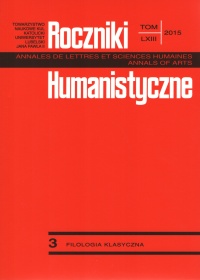The cognomen „Mus” in the plebeian family of the Decii
Abstract
The aim of the paper is the reexamination of the sources concerning the plebeian gens Decia to find a convincing explanation for the fact that one branch of this family was given the surname of “Mus”. At the beginning, two previous explanations of the enigmatic name’s origin are criticized. Firstly, I object to the interpretation of Laurens F. Janssen, who connects the animal surname to a devotio ritual performed by Publius Decius during the battle at Veseris in 340 B.C. Secondly, counter-arguments are presented against Jacques Heurgon’s opinion that there might be an etiological legend in the Livy’s description of the courageous exploits of P. Decius, the tribune of 343 B.C. The next, proper part of the article constitutes an attempt at a wider description of the factors which may have led to the creation of the cognomen “Mus”. To begin with, the remaining Roman aitiological legends, explaining the origin of surnames in certain families, are recalled. Moreover, an attempt is made to determine, at what time Decii were called “mices”. At last, I introduce the significance of the rodent in the Roman culture, which refers to the daily life and among which is usage of the word “mouse” as an invective. I eventually try to argue that Publius Decius (cos. 340 B.C.) received the cognomen due to his political connection with influential plebeians of the fourth century B.C.
References
Badian E.: P. Decius P. f. Subulo: An Orator of the Time of the Gracchi, “The Journal of Roman Studies” 46(1956), parts 1 and 2, s. 91-96
Broughton T.R.S.: The Magistrates of the Roman Republic, vol. 1-2, New York: American Philological Association 1951-1952.
Develin R.: The Integration of the Plebeians into the Political Order after 366 B.C., w: K.A. Raaflaub (ed.), Social Struggles in Archaic Rome. New Perspectives on the Conflict of the Orders, Malden–Oxford–Carlton: Blackwell Publishing 20052, s. 293-311.
Douglas A.E.: Roman Cognomina, „Greece&Rome” 5(1958), no 1, s. 62-66.
Forsythe G.: A Critical History of Early Rome. From Prehistory to the First Punic War, Berkeley–Los Angeles–London: University of California Press 2005.
Graf F.: Satire in Ritual Context, w: K. Freudenburg (ed.), The Cambridge Companion to Roman Satire, Cambridge: Cambridge University Press 2005, s. 192-206.
Guittard Ch.: Tite-Live, Accius, et le rituel de la devotio, „Comptes rendus des séances de l’Académie des Inscriptions et Belles-Lettres” 128(1984), no 4, s. 581-600.
Heurgon J.: Recherches sur l’historie, la religion et la civilisation de Capoue préromaine des origins à la deuxième guerre punique, Paris: de Boccard 1942.
Janssen L.F.: Some Unexplored Aspects of Devotio Deciana, „Mnemosyne” 34(1981), no 3/4, s. 357-381.
Kajanto I.: The Latin Cognomina, Helsinki: Keskuskirjapaino 1965.
Korpanty J.: Z dziejów rzymskiej „pietas”, „Meander” 30(1975), no 1, s. 7-18.
Korpanty J.: Historiografia rzymska epoki archaicznej i cycerońskiej, Wrocław–Warszawa–Kraków–Gdańsk: Zakład Narodowy im. Ossolińskich 1977.
Lewandowski I.: Historiografia rzymska, Poznań: Wydawnictwo Poznańskie 2007.
McDonnel M.: Roman Manliness. Virtus and the Roman Republic, Cambridge: Cambridge University Press 2006.
McDonough Ch.: Ridiculus Mus: of Mice and Men in Roman Thought, w: P. Waldau, K. Patton (ed.), A Communion of Subjects: Animals in Religion, Science, and Ethics, New York–Chichester–West Sussex: Columbia University Press 2006, s. 413-422.
Münzer F.: Roman Aristocratic Parties and Families, trad. T. Ridley, Baltimore–London: The Johns Hopkins University Press 1999.
Oakley S.P.: A Commentary on Livy. Books VI-X, t. 1-4, Oxford, New York: Oxford University Press 1999 (vol. 1), 1998 (vol. 2), 2005 (vol. 3), 20062 (vol. 4).
Popławski M.: Bellum Romanum. Sakralność wojny i prawa rzymskiego, Lublin: Wydawnictwo KUL 20112.
Richardson J.H.: The Fabii and the Gauls. Studies in historical thought and historiography in Republican Rome, Stuttgart: Franz Steiner Verlag 2012.
Rosenstein N., Aristocratic Values, w: N. Rosenstein, R. Morstein-Marx (ed.), A Companion to the Roman Republic, Malden–Oxford–Carlton: Blackwell Publishing 2006, s. 365-382
Rüpke J.: Communicating with the Gods, w: N. Rosenstein, R. Morstein-Marx (ed.), A Companion to the Roman Republic, Malden–Oxford–Carlton: Blackwell Publishing 2006, s. 215-235.
Skutsch O., Cornell T.J.: Book VI of Ennius’ Annals, „The Classical Quarterly” 37(1987), no 2, s. 512-516.
Smith C.J.: The Roman Clan. The Gens from Ancient Ideology to Modern Anthropology, Cambridge: Cambridge University Press 2006.
Smith R.E.: The Law of Libel at Rome, „The Classical Quarterly” 1(1951), no 3/4, s. 169-179.
Stawecka K.: Virtus jako ideał życiowy w piśmiennictwie przedcycerońskim, „Roczniki Humanistyczne” 16(1968), z. 3, s. 73-92.
Steele R.B.: Roman Personal Names, „The Classical Weekly” 11(1918), no 15, s. 113-118.
Thesaurus linguae Latinae, editus iussu et auctoritate consilii ab academiis societatibusque diversarum nationum electi, vol. 2, fasc. 4, Leipzig: Teubner 1988.
Thesaurus linguae Latinae, editus iussu et auctoritate consilii ab academiis societatibusque diversarum nationum electi, vol. 8, fasc. 11, Leipzig: Teubner 1991.
Walbank F.W., Astin A.E., Frederiksen M.W. et alii (eds.): The Cambidge Ancient History. Second Edition, vol. 7, part 2: The Rise of Rome to 220 B.C., Cambridge: Cambridge University Press 20065.
Versnel H.S.: Two Types of Roman Devotio, „Mnemosyne” 29(1976), no 4, s. 365-410.
Wheeler E.L.: Sapiens and Stratagems: The Neglected Meaning of a Cognomen, „Historia: Zeitschrift für Alte Geschichte” 37(1988), no 2, s. 166-195.
Wiseman T.P.: Roman Drama and Roman History, Exeter: University of Exeter Press 1998.
Copyright (c) 2015 Roczniki Humanistyczne

This work is licensed under a Creative Commons Attribution-NonCommercial-NoDerivatives 4.0 International License.





